Book contents
- Frontmatter
- Contents
- Foreword by Mark Evan Bonds
- Acknowledgments
- Abbreviations
- Chronology
- Introduction
- Part One Rules of Engagement
- Part Two Liberalism and Societal Order
- Part Three Memoirs and Meaning in Social Contexts
- Part Four Critical Battlefields
- 12 Hanslick and Hugo Wolf
- 13 Battle Rejoined: Hanslick and the Symphonic Poem in the 1890s
- 14 On “Jewishness” and Genre: Hanslick's Reception of Gustav Mahler
- Selected Bibliography
- List of Contributors
- Index
14 - On “Jewishness” and Genre: Hanslick's Reception of Gustav Mahler
from Part Four - Critical Battlefields
Published online by Cambridge University Press: 05 July 2013
- Frontmatter
- Contents
- Foreword by Mark Evan Bonds
- Acknowledgments
- Abbreviations
- Chronology
- Introduction
- Part One Rules of Engagement
- Part Two Liberalism and Societal Order
- Part Three Memoirs and Meaning in Social Contexts
- Part Four Critical Battlefields
- 12 Hanslick and Hugo Wolf
- 13 Battle Rejoined: Hanslick and the Symphonic Poem in the 1890s
- 14 On “Jewishness” and Genre: Hanslick's Reception of Gustav Mahler
- Selected Bibliography
- List of Contributors
- Index
Summary
Hanslick De-Formalized
The historian Peter Gay concludes his 1978 book Freud, Jews and Other Germans: Masters and Victims in Modernist Culture with a chapter entitled “For Beckmesser: Eduard Hanslick, Victim and Prophet.” What is remarkable about the chapter is Gay's studied avoidance of the issue of anti-Semitism as it relates to arguments about Die Meistersinger or Hanslick, or both. In a book that elsewhere addresses issues of anti-Semitism, this last chapter fashions Hanslick as one of the “other Germans” of its title. The issue of anti-Semitism, however, is picked up in two of the chapter's footnotes. Footnote fourteen cites Friedrich Blume's encyclopedia entry for Hanslick in the 1956 Musik in Geschichte und Gegenwart, calling it “an authoritative treatment, though somewhat marred by an unnecessary ‘defense’ against the ‘charge’ that Hanslick was of Jewish descent.” Here, Gay signals his own reason for sidestepping the issue of Hanslick's Jewish descent. Footnote forty-three, a long footnote coming almost at the end of the chapter and hence the book, explains why:
In one rather wry way, one can define Hanslick as a “modern” through his presumed Jewishness, since to anti-Semites, Jews were the “moderns.” As Hanslick noted in his autobiography, Wagner “accused” him of being Jewish, in the second edition of his Judentum in der Musik (1869), in which Wagner calls Vom Musikalisch-Schönen “a lampoon, written with extraordinary cleverness, in the interest of music-Jewry.”
- Type
- Chapter
- Information
- Rethinking HanslickMusic, Formalism, and Expression, pp. 311 - 338Publisher: Boydell & BrewerPrint publication year: 2013



